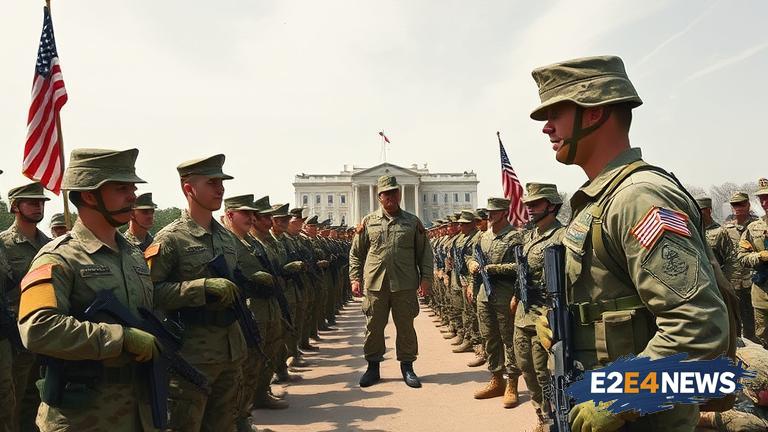The recent order by President Trump to train National Guard troops has sparked controversy among Democrats, who argue that the move is an attempt to militarize the border and undermine the role of law enforcement agencies. The order, which was announced earlier this week, aims to provide additional training to National Guard troops in order to support border control efforts. However, Democrats have expressed concerns that the move is a power grab by the Trump administration, and that it could lead to the misuse of military personnel. They also argue that the order is an attempt to distract from the administration’s failed immigration policies. The training program, which is set to begin in the coming weeks, will focus on providing National Guard troops with the skills and equipment needed to support border control efforts. This includes training on surveillance, intelligence gathering, and crowd control. The program will also provide troops with access to advanced technology, including drones and sensors. Despite the concerns raised by Democrats, the Trump administration has defended the order, arguing that it is necessary to address the ongoing crisis at the border. The administration has also pointed to the success of previous National Guard deployments, which have helped to reduce the flow of illegal immigrants and improve border security. However, Democrats have countered that the order is a waste of resources, and that it will do little to address the root causes of the crisis. They have also raised concerns about the potential for human rights abuses, and the impact that the training program could have on local communities. The controversy surrounding the order has highlighted the deep divisions within the US government over immigration policy. While the Trump administration has taken a hardline approach to border control, Democrats have advocated for a more nuanced approach that prioritizes humanitarian concerns and addresses the root causes of migration. The debate over the order has also sparked a wider conversation about the role of the military in domestic law enforcement. While some argue that the military has a critical role to play in supporting border control efforts, others argue that it is a step too far and that it could lead to the erosion of civil liberties. The issue has also raised questions about the relationship between the federal government and the states, with some arguing that the order is an attempt to usurp the authority of state and local law enforcement agencies. As the controversy continues to unfold, it remains to be seen how the training program will be implemented, and what impact it will have on border control efforts. The Trump administration has vowed to push ahead with the program, despite the opposition from Democrats. However, it is likely that the issue will continue to be a source of controversy and debate in the coming weeks and months. The order has also sparked concerns among civil liberties groups, who argue that it could lead to the misuse of military personnel and the erosion of human rights. They have also raised concerns about the potential for racial profiling and discrimination. The issue has also highlighted the need for a more comprehensive approach to immigration policy, one that prioritizes humanitarian concerns and addresses the root causes of migration. The controversy surrounding the order has also sparked a wider conversation about the role of the media in shaping public opinion on immigration policy. While some argue that the media has a critical role to play in holding the government to account, others argue that it has contributed to the polarization of the debate. As the issue continues to unfold, it remains to be seen how the media will cover the training program, and what impact it will have on public opinion. The order has also raised questions about the impact that it could have on the upcoming elections, with some arguing that it could be a major issue for voters. However, it is likely that the issue will continue to be a source of controversy and debate, regardless of the outcome of the elections. The controversy surrounding the order has also highlighted the need for greater transparency and accountability in government, particularly when it comes to issues related to national security and immigration policy. The issue has also sparked concerns among lawmakers, who argue that the order is an attempt to bypass Congress and undermine the legislative process. They have also raised concerns about the potential for the order to be used as a pretext for further militarization of the border. The order has also raised questions about the relationship between the US and its international partners, particularly when it comes to issues related to migration and border control. The controversy surrounding the order has also sparked a wider conversation about the role of technology in shaping immigration policy, particularly when it comes to issues related to surveillance and intelligence gathering. The issue has also highlighted the need for a more nuanced approach to immigration policy, one that prioritizes humanitarian concerns and addresses the root causes of migration. The controversy surrounding the order has also raised questions about the impact that it could have on local communities, particularly those that are located near the border. The issue has also sparked concerns among environmental groups, who argue that the order could lead to the destruction of natural habitats and the erosion of environmental protections. The controversy surrounding the order has also highlighted the need for greater cooperation and collaboration between different levels of government, particularly when it comes to issues related to immigration policy and border control.




